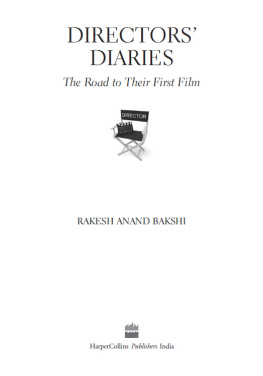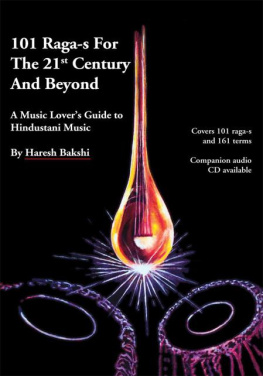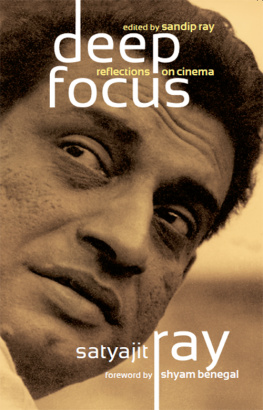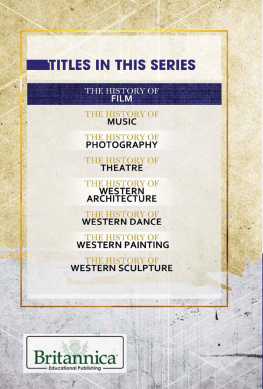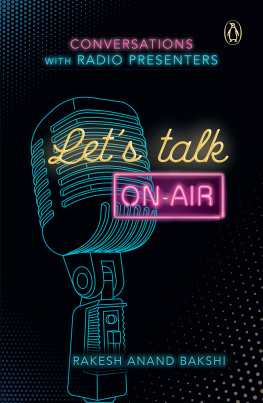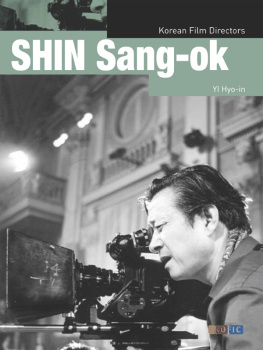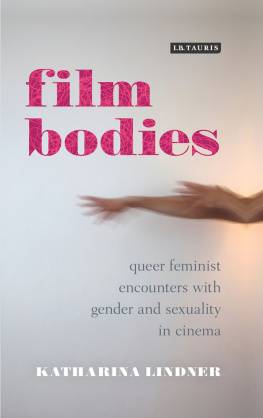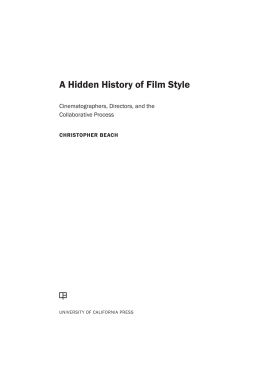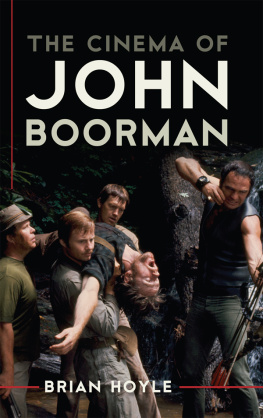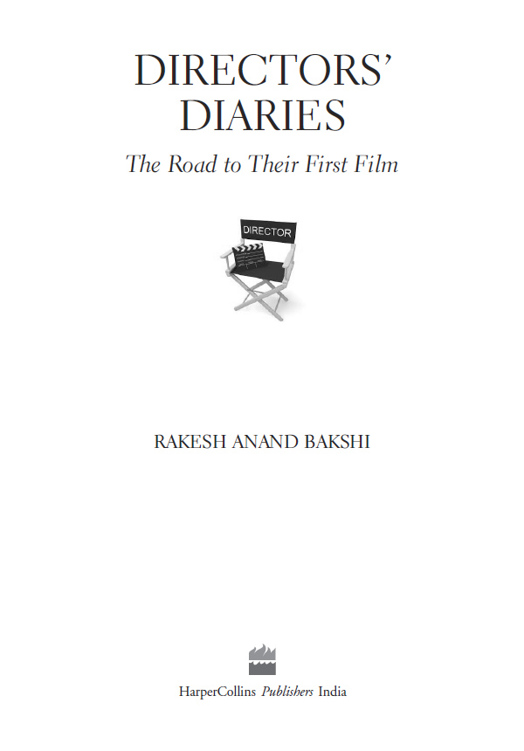To those who were there, and are not,
and to those who were there, and are:
my mother, Kamla Mohan,
my father, Anand Prakash Bakshi,
my brother, Rajesh (Gogi), and
my sisters, Suman (Pappi) and Kavita (Rani)I love you all, even though I may not always express it.
This book is a tribute to my father, lyrics writer Anand Bakshi, (Anand Prakash Bakshi) who wrote nearly 3,300 songs for 623 Hindi and Punjabi films, from 1956 to 2002.
Film-making is a chance to lead many lifetimes
Robert Altman
Robert Altmans quote celebrates film-making like no other. It also sums up the dedication and passion that one needs to be a film-maker. Each film is akin to living a full lifetime of joy, sorrow, success, failure, agony and ecstasy. Every film-maker must understand this and with each roll of the dice, take a fickle audiences reaction in their stride.
The Western world has had a long history of teaching film-making and film-makers. The culture of film schools being a strong breeding ground for creativity and a professional approach has existed for many years in the West. India though has lagged behind in this. We are still a young country and an emerging India needed engineers, accountants and lawyers more than creative prima donnas.
Yet, India has had some wonderful film-makers. Despite the lack of education, Indias film-makers and films have thrived on a self-taught, vocational method of learning, coupled with genuine genius. This book seeks to tell some of the stories of this wonderful array of film-makers. Each one is an institution in themselves with a body of work that any film school will be happy to incorporate into its curriculum.
Future generations of film-makers need a repository such as this. A place they can seek answers to questions and have an in-depth study about how the masters themselves grappled with similar issues. For every director will undergo myriad challenges. Only those who face up to them will last and leave a legacy similar to the celebrated artists in this book.
A director is the captain of the ship. A man that everyone turns to in an hour of crisis. Reading about experiences of others helps upcoming film-makers realize that direction is about more than just handling an individual vision, it is about handling people artists, technicians, financiers, distributors, media, audiences, critics, etc. A director has to deal with all these different individuals and do it with a certain panache if he or she hopes to be successful in the profession. This cannot be taught. No school can prepare an aspirant for this. Experience really is the best teacher in this case and in this book you are learning from the best of the best.
As the president of Asias largest film school, it has been my privilege to hear many of the directors in this book speak to students. The knowledge they pass on is invaluable. It can sometimes spell the difference between making a career in cinema and returning to a family business. A word of encouragement or a connection of mindsets through a similar journey can suddenly open a students mind like no book or project. These tools can then aid the student to reinforce that open mind.
We have found that this blend of experiential teaching prepares students and aspirants for the challenges ahead better than anything else and we are proud to have some of these names associated with us and thrilled that this book now exists for students to hungrily devour as they seek more and more knowledge about this most complex of arts.
So here is a chance to live many lifetimes. Through the eyes of several of Indias most celebrated film-makers. They share their experiences of the past from which we can learn and use as a guide to a great future.
MEGHNA GHAI PURI
President
Whistling Woods International
Institute for Films, Media, Animation and Media Arts, Mumbai.
One of the greatest directors in the world of cinema, Federico Fellini, made a small masterpiece,
Orchestra Rehearsal, about great musicians of an orchestra revolting against the conductor, resulting in cacophony. Its a metaphor about chaos versus order, but it perfectly refers to the film directors job.
In another huge masterpiece and Oscar winner, 8, Fellini tells the story of a film director, who, after much soul searching, decides to abandon the making of a sci-fi genre movie in favour of one thats about his own personal life experiences, his wife and his lovers, his parents passing away, his childhood memories, etc.
Fellinis dilemma is clear: direct a genre movie as an industry assignment or create a film of more personal expression.
There are three types of directors at work in the world: craft, mise en scne and auteur (author).
Craft directors outnumber all others, they direct non-narrative programmes from coverage of sport events, parades, reality shows, commercials (without actors), corporate and web videos, etc. They basically package information in different audio-visual formats expertly. Mise en scne directors (the term literally means placing on stage in French) deal with the queen of the media, narrative storytelling, however, only in genres clearly defined by the film and television industry and the marketplace. These genre of directors make everything ranging from run-of-the-mill television series to pretty successful feature films.
Genres are one per film in Hollywood like horror, action, mystery, etc., while in traditional Bollywood it is a masala of several genres to cater to every member of the audience within the same film. The best mise en scne directors are able to put a personal touch on the genre piece and there are a few truly exceptional ones like Roman Polanski and Alfred Hitchcock who can subvert the genre for a new and deeper message. Polanskis Chinatown portrays law enforcement as the real criminals for the first time and in Psycho, Hitchcock shows how mundane, petty crime is avenged by an irrational lunatic as brutal as nature can be. An irrational horror underneath the fragile veneer of human existence bursts to the surface. This is a philosophical layer under the story and that is what distinguishes the auteur (author) directors. These are the smallest group of directors, working mostly beyond genres, commenting on the human condition in the universe.
That is what really the term auteur means, not simply a director who also writes the screenplay, if that is firmly within the world of the genres. Auteurs comment on the universe and on the human condition even when they work in comedies think of Charlie Chaplin, Jacques Tati or Woody Allen. After all, philosophical comedy reaches all the way back to the Enlightenment, like in Voltaire.
All in all, directors have come a long way from being the sidekick of the cinematographers in early film-making providing crowd control to the visionary storytellers of our time.
Can people be taught to become directors? Most certainly. As a film educator, educating hundreds of directors on all levels, I can safely say that anyone can be taught to become a decent craft, or even a genre director (the audience will not notice that they are mediocre as at least 80 per cent of all products are mediocre). However, you cannot teach the auteurs beyond craft because that is an innate artistic quality.
I always tell my students that they will never find a Help Wanted ad for a feature film director in the newspaper. That job actually does not exist, you have to create that job for yourself by studying, by perseverance, by devotion and hard work.

